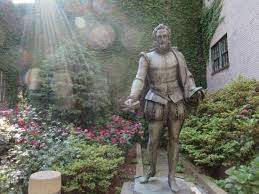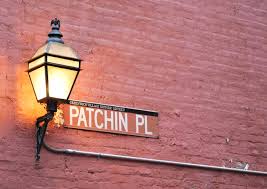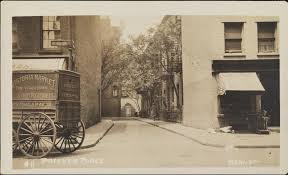30 Writers Other Writers Loved To Hate
Norman Mailer could throw some serious shade.
. Jack Kerouac

Tom Palumbo

Signet
“None of these people [in the Beat Generation] have anything interesting to say, and none of them can write, not even Mr. Kerouac. It’s not writing, it’s typing.” — Truman Capote
“His rhythms are erratic, his sense of character is nil, and he is as pretentious as a rich whore, sentimental as a lollypop.” — Norman Mailer
2. Truman Capote

Roger Higgins / via commons.wikimedia.org

Random House
“He’s a full-fledged housewife from Kansas with all the prejudices.” — Gore Vidal
3. Saul Bellow

Keith Botsford

Penguin
“[It’s] not that there were no ideas in Herzog to be pondered, but rather that these ideas were not Bellow’s own theses, but rather ideas he had picked up in his reading. His mind is very intelligent, very cultured, very cultivated. He’s read a million books and remembered them, but he is not an original thinker..” — Norman Mailer
4. Mark Twain

Charles Webster
“[A] hack writer who would not have been considered fourth rate in Europe, who tricked out a few of the old proven ‘sure fire’ literary skeletons with sufficient local color to intrigue the superficial and the lazy.” — William Faulkner
5. Ernest Hemingway

Lloyd Arnold

Charles Scribners Sons
“I read him for the first time in the early Forties, something about bells, balls and bulls, and loathed it.” — Vladimir Nabokov
“People always think that the reason he’s easy to read is that he is concise. He isn’t. I hate conciseness — it’s too difficult. The reason Hemingway is easy to read is that he repeats himself all the time, using ‘and’ for padding.” — Tom Wolfe
“No courage. Never been known to use a word that might send the reader to a dictionary.” — William Faulkner, as recounted by A.E. Hotchner
6. William Faulkner

Carl Von Vechter

Penguin
“Poor Faulkner. Does he really think big emotions come from big words?” — Ernest Hemingway
“Have you ever heard of anyone who drank while he worked? You’re thinking of Faulkner. He does sometimes – and I can tell right in the middle of a page when he’s had his first one.” — Ernest Hemingway, again
7. Evelyn Waugh

Carl Van Vechten

Chapman & Hall
“His style has the desperate jauntiness of an orchestra fiddling away for dear life on a sinking ship.” — Edmund Wilson
8. Marcel Proust

Modern Library
“I am reading Proust for the first time. Very poor stuff. I think he was mentally defective.” — Evelyn Waugh
9. E.M. Forster

Dora Carrington

Signet
”[Howard’s End] is not good enough. E.M. Forster never gets any further than warming the teapot. He’s a rare fine hand at that. Feel this teapot. Is it not beautifully warm? Yes, but there ain’t going to be no tea.” — Katherine Mansfield
10. James Joyce

Sylvia Beach
”[Ulysses] is a revolting record of a disgusting phase of civilisation; but it is a truthful one; and I should like to put a cordon around Dublin; round up every male person in it between the ages of 15 and 30; force them to read it; and ask them whether on reflection they could see anything amusing in all that foul mouthed, foul minded derision and obscenity.” — George Bernard Shaw
“[Ulysses is] the work of a queasy undergraduate scratching his pimples.” — Virginia Woolf
11. Edgar Allan Poe

Bantam Classics
“[To take Poe] with more than a certain degree of seriousness is to lack seriousness one’s self. An enthusiasm for Poe is the mark of a decidedly primitive stage of reflection.” — Henry James
12. William Shakespeare

Bantam
“The intensity of my impatience with him occasionally reaches such a pitch, that it would positively be a relief to me to dig him up and throw stones at him, knowing as I do how incapable he and his worshippers are of understanding any less obvious form of indignity.” — George Bernard Shaw
13. Jane Austen

c.1810)_hires.jpg”>en.wikipedia.org

Penguin
“I am at a loss to understand why people hold Miss Austen’s novels at so high a rate, which seem to me vulgar in tone, sterile in artistic invention, imprisoned in their wretched conventions of English society, without genius, wit, or knowledge of the world. Never was life so pinched and narrow. The one problem in the mind of the writer … is marriageableness.” — Ralph Waldo Emerson
“I often want to criticize Jane Austen, but her books madden me so that I can’t conceal my frenzy from the reader; and therefore I have to stop every time I begin. Every time I read Pride and Prejudice, I want to dig her up and hit her over the skull with her own shin-bone.” — Mark Twain
14. Joseph Conrad

George Charles Beresford

Penguin
“I cannot abide Conrad’s souvenir shop style and bottled ships and shell necklaces of romanticist clichés.” — Vladimir Nabokov
15. Alexander Pope

Michael Dahl

Penguin
“There are two ways of disliking poetry; one way is to dislike it, the other is to read Pope.” — Oscar Wilde
16. Ezra Pound

Alvin Langdon Coburn

New Directions
“A village explainer. Excellent if you were a village, but if you were not, not.” — Gertrude Stein
17. J.K. Rowling

Carlo Allegri / Reuters

Scholastic
“How to read Harry Potter and the Sorcerer’s Stone? Why, very quickly, to begin with,
perhaps also to make an end. Why read it? Presumably, if you cannot be persuaded to read anything better, Rowling will have to do.” — Harold Bloom
18. John Updike

Penguin
“My moral complaint was that Updike had tremendous, Nabokov-level talent and was wasting it, because he was too charmed by his daily dumps and too afraid of irregularity to take the kind of big literary risks that might have blocked him for a year or two. …Updike was exquisitely preoccupied with his own literary digestive processes, and his virtuosity in clocking and rendering the minutiae of daily life was undeniably unparalleled, but his lack of interest in the bigger postwar, postmodern, socio-technological picture marked him, in my mind, as a classic self-absorbed sixties-style narcissist.” — Jonathan Franzen
“Maybe the only thing the reader ends up appreciating about [Toward the End of Time protagonist] Ben Turnbull is that he’s such a broad caricature of an Updike protagonist that he helps us figure out what’s been so unpleasant and frustrating about this gifted author’s recent characters. It’s not that Turnbull is stupid… It’s that he persists in the bizarre adolescent idea that getting to have sex with whomever one wants whenever one wants is a cure for ontological despair. And so, it appears, does Mr. Updike…” — David Foster Wallace
19. Miguel de Cervantes

Juan de Jáuregui

Harper Perennial
“Reading Don Quixote can be compared to an indefinite visit from your most impossible senior relative, with all his pranks, dirty habits, unstoppable reminiscences, and terrible cronies.” — Martin Amis
20. George Orwell

BNUJ

Signet
“He could not blow his nose without moralising on the state of the handkerchief industry.” — Cyril Connolly
21. Honoré de Balzac

Modern Library Classics
“What a man Balzac would have been if he had known how to write.” — Gustave Flaubert
22. Henry David Thoreau

Benjamin D. Maxham

Prometheus
“He was imperfect, unfinished, inartistic; he was worse than provincial — he was parochial.” — Henry James
23. Virginia Woolf

George Charles Beresford

Harcourt Brace
“Virginia Woolf’s writing is no more than glamorous knitting. I believe she must have a pattern somewhere.” — Dame Edith Sitwell
24. Walt Whitman

Penguin
“Like a large shaggy dog, just unchained, scouring the beaches of the world and baying at the moon.” — Robert Louis Stevenson
25. T.S. Eliot

Barnes and Noble Classics
“If I knew that by grinding Mr. Eliot into a fine dry powder and sprinkling that powder over [Joseph] Conrad’s grave Mr. Conrad would shortly appear…. I would leave for London tomorrow morning with a sausage grinder.” — Ernest Hemingway
26. Bertolt Brecht

Getty Images
“Personally I would rather have written Winnie-the-Pooh than the collected works of Brecht.” — Tom Stoppard
27. Bret Easton Ellis

Getty Images

Vintage Books
”[American Psycho] panders shamelessly to the audience’s sadism for a while, but by the end it’s clear that the sadism’s real object is the reader herself […] In dark times, the definition of good art would seem to be art that locates and applies CPR to those elements of what’s human and magical that still live and glow despite the times’ darkness. Really good fiction could have as dark a worldview as it wished, but it’d find a way both to depict this world and to illuminate the possibilities for being alive and human in it. You can defend Psycho as being a sort of performative digest of late-eighties social problems, but it’s no more than that.” — David Foster Wallace
28. David Foster Wallace

Keith Bedford / Getty Images

Little, Brown
“Saint David Foster Wallace: a generation trying to read him feels smart about themselves which is part of the whole bullshit package.” — Bret Easton Ellis
29. Agatha Christie

Keystone / Stringer / Getty Images

Cardinal
“To say that Agatha Christie’s characters are cardboard cut-outs is an insult to cardboard cut-outs.” — Ruth Rendell
30. J.D. Salinger

Associated Press

Little, Brown
“I seem to be alone in finding him no more than the greatest mind ever to stay in prep school.” — Norman Mailer
“It took me days to go through [Catcher in the Rye], gingerly, a page at a time, and blushing with embarrassment for him every ridiculous sentence of the way. How can they let him do it?” — Elizabeth Bishop
“[Franny and Zooey] suffers from this terrible sort of metropolitan sentimentality and it’s so narcissistic … so false, so calculated. Combining the plain man with an absolutely megalomaniac egotism. I simply can’t stand it.” — (Mary McCarthy
















 When Patchin Place and its houses were built by 1849, West 10th Street was still known as Amos Street: the principal heir of
When Patchin Place and its houses were built by 1849, West 10th Street was still known as Amos Street: the principal heir of ![3109782939_cd649a9092[1]](https://i0.wp.com/s.art-nerd.com/newyork/wp-content/uploads/sites/5/2013/12/3109782939_cd649a90921.jpg)
![barnes[1]](https://i0.wp.com/s.art-nerd.com/newyork/wp-content/uploads/sites/5/2013/12/barnes1.jpg)
